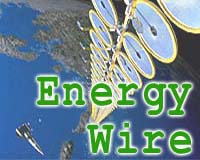| . |  |
. |
Boston - Mar 07, 2003 Even with aggressive research, the hydrogen fuel-cell vehicle will not be better than the diesel hybrid (a vehicle powered by a conventional engine supplemented by an electric motor) in terms of total energy use and greenhouse gas emissions by 2020, says a study recently released by the Laboratory for Energy and the Environment (LFEE). And while hybrid vehicles are already appearing on the roads, adoption of the hydrogen-based vehicle will require major infrastructure changes to make compressed hydrogen available. If we need to curb greenhouse gases within the next 20 years, improving mainstream gasoline and diesel engines and transmissions and expanding the use of hybrids is the way to go. These results come from a systematic and comprehensive assessment of a variety of engine and fuel technologies as they are likely to be in 2020 with intense research but no real "breakthroughs." The assessment was led by Malcolm A. Weiss, LFEE senior research staff member, and John B. Heywood, the Sun Jae Professor of Mechanical Engineering and director of MIT's Laboratory for 21st-Century Energy. Release of the study comes just a month after the Bush administration announced a billion-dollar initiative to develop commercially viable hydrogen fuel cells and a year after establishment of the government-industry program to develop the hydrogen fuel-cell-powered "FreedomCar." The new assessment is an extension of a study done in 2000, which likewise concluded that the much-touted hydrogen fuel cell was not a clear winner. This time, the MIT researchers used optimistic fuel-cell performance assumptions cited by some fuel-cell advocates, and the conclusion remained the same. The hydrogen fuel-cell vehicle has low emissions and energy use on the road -- but converting a hydrocarbon fuel such as natural gas or gasoline into hydrogen to fuel this vehicle uses substantial energy and emits greenhouse gases. "Ignoring the emissions and energy use involved in making and delivering the fuel and manufacturing the vehicle gives a misleading impression," said Weiss. However, the researchers do not recommend stopping work on the hydrogen fuel cell. "If auto systems with significantly lower greenhouse gas emissions are required in, say, 30 to 50 years, hydrogen is the only major fuel option identified to date," said Heywood. The hydrogen must, of course, be produced without making greenhouse gas emissions, hence from a non-carbon source such as solar energy or from conventional fuels while sequestering the carbon emissions. The assessment highlights the advantages of the hybrid, a highly efficient approach that combines an engine (or a fuel cell) with a battery and an electric motor. Continuing to work on today's gasoline engine and its fuel will bring major improvements by 2020, cutting energy use and emissions by a third compared to today's vehicles. But aggressive research on a hybrid with a diesel engine could yield a 2020 vehicle that is twice as efficient and half as polluting as that "evolved" technology, and future gasoline engine hybrids will not be far behind, the study says. Other researchers on the study were Andreas Schafer, principal research engineer in the Center for Technology, Policy and Industrial Development, and Vinod K. Natarajan (S.M. 2002).
Related Links  Bentley - Feb 17, 2003
Bentley - Feb 17, 2003The global oil and gas industry will benefit from the establishment of a world-class energy technology research alliance signed recently in Western Australia. |
|
| The content herein, unless otherwise known to be public domain, are Copyright 1995-2006 - SpaceDaily.AFP and UPI Wire Stories are copyright Agence France-Presse and United Press International. ESA PortalReports are copyright European Space Agency. All NASA sourced material is public domain. Additionalcopyrights may apply in whole or part to other bona fide parties. Advertising does not imply endorsement,agreement or approval of any opinions, statements or information provided by SpaceDaily on any Web page published or hosted by SpaceDaily. Privacy Statement |